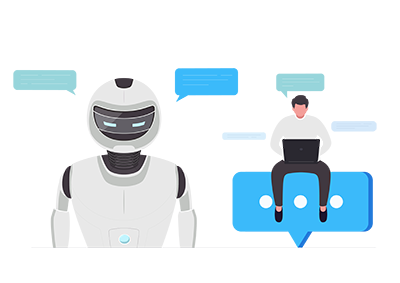THE AI REVOLUTION
In Manufacturing Marketing
The manufacturing sector has come a long way since the advent of digital technologies and the emergence of the smart factory. As we enter the fifth industrial revolution, where humans and machines will work synergistically, it is time for marketing teams to incorporate digital transformation into their strategies too. AI plays a pivotal role by enabling manufacturers to create and scale targeted campaigns that can improve customer experiences and promote smarter working practices.

The AI advantage: The evolution of manufacturing marketing
The second industrial revolution of the late 1800s heralded a period of unprecedented change in the way manufacturers produced goods. With mass production being possible for the first time, businesses could reach much larger audiences, and thus the concept of marketing was born.
That basic concept – to promote a company’s products or services – has remained largely the same ever since. But today, instead of print ads, billboards, and TV commercials, marketers are turning to strategies that emphasise the importance of the customer experience. In doing so, they are investing heavily in creating content that delivers real value to their audiences.
As an old-world industry, many manufacturers still rely heavily on traditional marketing methods such as industry events and networking to find distributors, retailers, and other buyers for their products. They also rely on these channels to generate leads and referrals. While there is nothing wrong with these methods, digital strategies present many additional opportunities, especially when augmented using the power of artificial intelligence.
AI has the advantage that it can augment and scale marketing strategies and goals, including customer segmentation, content personalisation, and predictive analytics. Given that around three quarters of manufacturers have fewer than nine employees in their marketing departments1, AI has substantial potential to overcome the problem of limited resources.
Making the case for AI: Why manufacturers need AI in marketing
Many manufacturers have already made the transition to digital marketing to improve sales, increase brand awareness, and reach broader audiences. Some of the most important tactics include leveraging online reviews and testimonials, publishing videos and blogs, and social media marketing. However, challenges remain, particularly regarding producing high-quality content, accurately measuring campaign performance, and aligning strategy with the buyer journey.
To remain relevant, manufacturers must step up their marketing by investing in solutions and expertise that help them scale their operations. The key advantage of AI is that it works at machine speed to analyse the increasingly vast amounts of data that organisations collect during their day-to-day operations. AI can turn data into insight by identifying patterns and trends. This provides a complete overview of customer behaviour for decision-makers to understand what works and what does not, ensuring that their budgets do not go to waste.
The scalability benefit of AI cannot be underestimated. Few manufacturers have a fully staffed marketing department, which is understandable when topics like research and development (R&D), and production line optimisation and maintenance are prioritised. However, like any business, they also need to attract customers by standing out in a highly competitive landscape. By assisting in the creation of personalised customer outreach strategies and data-driven decision making, AI lets lean marketing teams achieve more.
Building better relationships: How AI improves customer experience
Customer experience is the new marketing, simply because the experience that a customer has when dealing with a business is what ultimately determines their loyalty to the brand and the likelihood of their recommending it to others. Customer experience is important for any business, but in few cases is it more vital than in the manufacturing space, which typically involves very large transactions and long-term relationships with distributors and retailers.
It might sound counterintuitive at a time when people have grown tired of things like chatbots and auto attendants, but AI can also greatly improve the customer experience. As with almost any innovation, uptake and success depends on the deployment strategies. After all, the last thing a manufacturer wants when looking to expand its business is to have high-intent leads being turned away because they are unable to speak to a human in the sales team.
AI comes in many different forms, and it has reached the point where it has valuable utility in every stage of the sales and marketing cycle. For example, sentiment analysis can analyse customer communications to identify high-intent leads, while hyper-personalisation can precisely target the right people instead of bombarding them with irrelevant advertising content.
Augment, not replace: How AI helps marketing teams work smarter
While AI is undoubtedly a powerful tool, it should not be viewed primarily as a way to reduce costs or replace human talent. Effective marketing requires a set of innately human skills, such as creativity and critical thinking. Over-reliance on AI, especially when creating content, strips away the human element and, in doing so, erodes trust and authenticity – two things that B2B (or business-to-business) customer relationships are built on. Instead, AI must work in tandem with marketing teams to augment their abilities and free up time for people to focus on building real and meaningful relationships with their audiences. AI is not a silver bullet, but it is vital for automating repetitive tasks such as data entry and analysis, which are two things that marketing relies heavily upon.
To get the most out of AI, it is important to ask the right questions and set measurable goals. For example, instead of thinking about how you can use AI to reduce marketing overheads, you should be asking how it can automate steps such as outreach and lead generation. This approach has the overarching goal of reducing repetitive tasks for human teams so that they can better serve their customers. Furthermore, instead of asking what customers want, consider which specific features and functions they value in your products, so that AI can provide tailored insights to inform marketing strategies.
The future is now
Incorporating AI into marketing strategies is no longer just a trend for technology companies. It has now become a necessity for manufacturers to thrive in a competitive market, not to mention an uncertain economy. By leveraging AI to automate tasks, create personalised experiences, and empower people to work smarter, manufacturers can achieve more with less. The future is now, and AI is leading that transformation.

Sources
1. https://www.brandpoint.com/blog/digital-marketing-for-the-manufacturing-industry-2022-infographic/